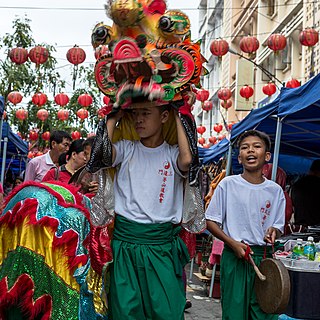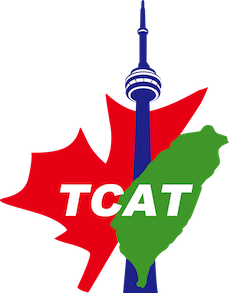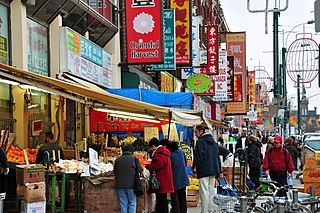
The Hakka, sometimes also referred to as Hakka Han, or Hakka Chinese, are a Han Chinese subgroup whose ancestral homes are chiefly in the Hakka-speaking provincial areas of Guangdong, Fujian, Jiangxi, Guangxi, Sichuan, Hunan, Zhejiang, Hainan, Guizhou and the island of Taiwan. The Chinese characters for Hakka literally mean "guest families". Unlike other Han Chinese subgroups, the Hakkas are not named after a geographical region, e.g. a province, county or city, in China. Modern day Hakka are generally identified by both full Hakka and by different degrees of Hakka ancestry and usually speak the Hakka language.

Chinese Canadians are Canadians of full or partial Chinese ancestry, which includes both naturalized Chinese immigrants and Canadian-born Chinese. They comprise a subgroup of East Asian Canadians which is a further subgroup of Asian Canadians. Demographic research tends to include immigrants from Mainland China, Hong Kong, and Macau, as well as overseas Chinese who have immigrated from Southeast Asia and South America into the broadly defined Chinese Canadian category.
Taiwanese Americans are Americans who carry full or partial ancestry from Taiwan. This includes American-born citizens who descend from migrants from Taiwan.

Toronto Chinatowns are ethnic enclaves in Toronto, Ontario, Canada, with a high concentration of ethnic Chinese residents and businesses. These neighbourhoods are major cultural, social and economic hubs for the Chinese-Canadian communities of the region. In addition to Toronto, several areas in the Greater Toronto Area also hold a high concentration of Chinese residents and businesses.

Fairchild TV or FTV is a Canadian Cantonese language exempt specialty channel. It is owned by Fairchild Group, with Hong Kong broadcaster TVB holding a 20% minority stake. Fairchild TV has studios in the Greater Toronto Area and Greater Vancouver.

Taiwanese Mandarin or Guoyu refers to any of the varieties of Mandarin Chinese spoken in Taiwan. This comprises two main forms: Standard Guoyu and Taiwan Guoyu.

The languages of Taiwan consist of several varieties of languages under the families of Austronesian languages and Sino-Tibetan languages. The Formosan languages, a branch of Austronesian languages, have been spoken by the Taiwanese aborigines in Taiwan for thousands of years. Owing to the wide internal variety of the Formosan languages, research on historical linguistics recognizes Taiwan as the Urheimat (homeland) of the whole Austronesian languages family. In the last 400 years, several waves of Han emigrations brought several different Sino-Tibetan languages into Taiwan. These languages include Taiwanese Hokkien, Hakka, and Mandarin, which have become the major languages spoken in Taiwan nowadays.
Taiwanese units of measurement are the customary and traditional units of measure used in Taiwan. The Taiwanese units formed in the 1900s when Taiwan was under Japanese rule. The system mainly refers to Japanese system. The measurement refers to the traditional size of a Japanese flooring mat called a Tatami mat which were positioned to completely cover the floor of traditional Japanese homes, therefore it became a convenient measurement tool as mat area was standardised hundreds of years ago. In Taiwan the measurement units are pronounced in Taiwanese Hokkien and Hakka before the World War II and adopted by the Mandarin speaking immigrants from China in 1949. Today, the Taiwanese units are used exclusively, in some cases alongside official SI units, and in other cases they have been replaced by SI.
Taiwanese drama (Chinese: 台灣電視劇; pinyin: Táiwān Diànshìjù, TDrama, and TWDrama, refer to dramatic programming of television programming extended stories usually dramatizing relationships through the general range of ten to forty one-hour episodes. They are produced in Taiwan and have gained increasing popularity in the Mandarin-speaking community internationally. The term "Taiwanese drama" is applied to Taiwanese miniseries in general, even including those with greater elements of comedy than of drama.

Taiwanese Canadian Association of Toronto (TCAT), the largest general-purpose all-ages Taiwanese organization in the Greater Toronto Area, was established back in 1963 and later registered as a non-profit organization in the Province of Ontario in 1975.

The Chinese Canadian community in the Greater Toronto Area was first established around 1877, with an initial population of two laundry owners. While the Chinese Canadian population was initially small in size, it dramatically grew beginning in the 1960s due to changes in immigration law and political issues in Hong Kong. Additional immigration from Southeast Asia in the aftermath of the Vietnam War and related conflicts and a late 20th century wave of Hong Kong immigration led to the further development of Chinese ethnic enclaves in the Greater Toronto Area. The Chinese established many large shopping centres in suburban areas catering to their ethnic group. There are 631,050 Chinese in the Greater Toronto Area as of the 2016 census, second only to New York City for largest Chinese community in North America.
Hoklo Taiwanese or Holo people are a major ethnic group in Taiwan whose ancestry is wholly or partially Hoklo. Being Taiwanese of Han origin, they are generally bilingual in Taiwanese Mandarin and Taiwanese Hokkien. Most descend from the Hoklo people of Quanzhou or Zhangzhou in Southern Fujian, China. The term as commonly understood signifies those whose ancestors immigrated to Taiwan before 1949.
Han Taiwanese or Taiwanese Han are a Taiwanese ethnic group, most of whom are of full or partial Han descent. According to the Executive Yuan of Taiwan, they comprise 95 to 97 percent of the Taiwanese population, which also includes Austronesians and other non-Han people. Major waves of Han immigration occurred since the 17th century to the end of Chinese Civil War in 1949, with the exception of the Japanese colonial period (1895-1945). Han Taiwanese mainly speak three languages of Chinese: Mandarin, Hokkien and Hakka.
Hakka Americans, also called American Hakka, are Han people in the United States of Hakka origin, mostly from present-day Guangdong, Fujian, and Taiwan. Many Hakka Americans have connections to Hakka diaspora in Jamaica, the Caribbean, South East Asia, Latin America, and South America. The Han characters for Hakka (客家) literally mean "guest families". Unlike other Han ethnic groups, the Hakkas are not named after a geographical region, e.g. a province, county or city. The Hakkas usually identify with people who speak the Hakka language or share at least some Hakka ancestry. The earliest Hakka immigrants to what is now the United States mostly went to Hawaii, starting when the Kingdom of Hawaii was an independent sovereign state. After the lifting of the Chinese Exclusion Act by the passage of the Magnuson Act in 1943, the Hakka began to come to the US from Taiwan and to a lesser extent Hong Kong, Southeast Asia, Jamaica and the Caribbean.
The usage of Chinese by the Chinese diaspora and their descendants has been determined by a large number of factors, including their ancestry, their migrant ancestors' "regime of origin", assimilation through generational changes, and official policies of their country of residence. The general trend is that more established Chinese populations in the Western world and in many regions of Asia have Cantonese as either the dominant variety or as a common community vernacular, while Mandarin is much more prevalent among new arrivals, making it increasingly common in many Chinatowns, though still not dominant.

Chao Feng Wu, also known as Ken Wu, is an American community leader based in Los Angeles area and proponent of Taiwan Independence movement.

Philosophy in Taiwan is the set of philosophical traditions in Taiwan, while Taiwanese philosophy is taken to mean philosophical work from the country. Philosophical thought in Taiwan is diverse, drawing influence from Chinese philosophy during Qing rule from the 17th and 18th century, and Western philosophy through the Kyoto School during Japanese rule in the 19th and early 20th century. Taiwanese philosophy took a more endogenous turn during the modern era, with burgeoning philosophical debate regarding Taiwanese Gemeinschaft.

Chinatown, Toronto known also as Downtown Chinatown or West Chinatown is a Chinese ethnic enclave located in the city's downtown core of Toronto, Ontario, Canada. It is centred at the intersections of Spadina Avenue and Dundas Street, West.
Taiwanfest, stylized TAIWANfest, formerly known as the Taiwanese Composers Music Festival, is an annual cultural festival held in Vancouverand Toronto. The original focus of TAIWANfest was to celebrate Taiwanese culture, however, in recent years, the festival expanded to include dialogues with local Canadian communities including Indigenous communities, Asian-Canadian communities, and other Asian cultures. It is reported to be the largest English/Mandarin bilingual cultural festival in Canada.










